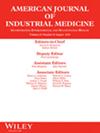Silica Hazards in Engineered Stone Countertop Production: Worker Experiences and Challenges in Los Angeles
Abstract
Background
Silicosis is a progressive occupational lung disease caused by inhalation of respirable crystalline silica. Stone countertop workers are at risk of developing silicosis associated with engineered stone (ES) due to its high silica content and widespread use. This qualitative study assessed countertop workers' knowledge, attitudes, and practices regarding silica hazards.
Methods
We recruited 20 participants for semi-structured interviews through purposive sampling of workplaces in Los Angeles, California. Eligibility requirements: employment in countertop fabrication, exposure to engineered stone, ≥ 18 years old, and English or Spanish proficiency. Interviews were recorded, translated, and transcribed. Two researchers employed thematic and content analysis to code transcripts using both inductive and deductive methods.
Results
All respondents were Latino men, 90% of whom were foreign-born, with a median age of 44 years and a median work tenure of 20 years. We identified five themes: (1) Hazardous work environments: Respondents regularly engaged in dry-cutting practices (68%), and half reported that their employers did not reliably provide respirators. (2) Insufficient training and educational resources: Respondents possessed basic knowledge that dust caused lung disease (90%); however, most acquired knowledge through word-of-mouth or media. (3) Employment vulnerability: Workers feared being fired for raising safety concerns. (4) Workforce entrapment: Although many workers considered leaving the industry, they were hindered by a lack of legal immigration status or alternative skills, as well as the presumed lower pay in a new industry. (5) Worker-identified solutions: Workers suggested wet cutting, workplace training, and regulation of ES, including its elimination.
Conclusion
The results support continued policy, regulatory, and enforcement efforts aimed at minimizing silica exposure. Workers recommended workplace and upstream solutions, such as eliminating ES.

 求助内容:
求助内容: 应助结果提醒方式:
应助结果提醒方式:


